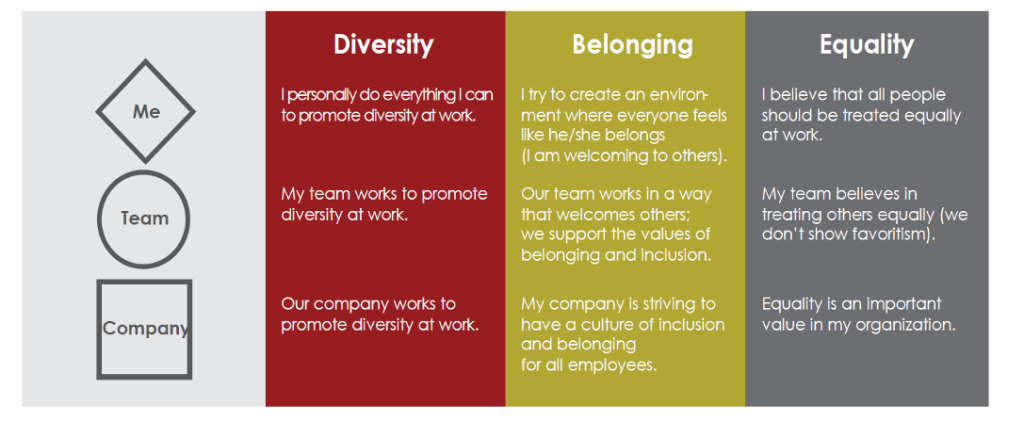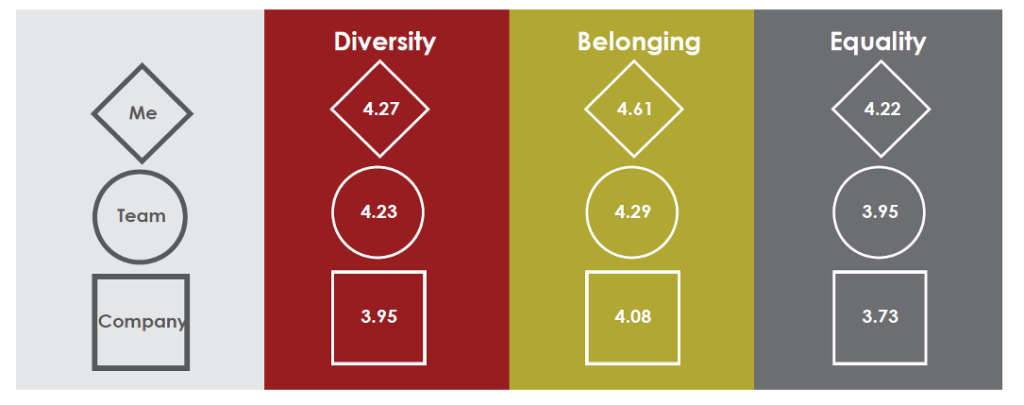In the Fall Leadership Pulse® report, we examined leader energy and attitudes toward diversity. However, rather than just asking about diversity in general, we did a deep dive examining the new language of diversity. Specifically, we looked at three items: diversity, belonging, and equality.
Why study equality?
We did this study before the COVID-19 virus consumed our lives with canceled meetings, foregone spring breaks and vacations, empty grocery shelves, and concern about family, friends, and colleagues. However, when I review these data and think about what’s happening today, it’s obvious the topic of equality is even more relevant than I thought it was a month ago. Who receives tests? Who gets financial help? How are decisions made about who gets into emergency rooms vs. waits? Whose jobs are saved, and who gets laid off? Overnight, questions about equality may indeed be more important than discussions about diversity, belonging, inclusion, and more. Are certain subgroups in society treated differently, and are some groups differentially affected and perhaps need more help than others?
Thus, in this article, I will first go over the findings in the Fall Leadership Pulse and then consider why these discussions are so important for all of us today.
Our first finding was that regardless of the way we studied this topic, there was a lot of high emotion and extreme attitudes about equality. At the same time, there is some pretty groundbreaking work being done on this subject today. For example, look at what Salesforce has done. Their CEO has taken on equality, featured on 60 Minutes for their CEO’s work bringing female wages in line with male wages. Their diversity and inclusion program is very focused on the goals of equality; however, they have been intentional in their use of the term to focus on exactly why equality is important. An introduction to their thinking, from their web page, follows:
Building a Workplace That Reflects Society
Equality is a core value at Salesforce. We believe that businesses can be powerful platforms for social change and that it is our responsibility to further Equality for all. Creating a culture of Equality isn’t just the right thing to do; it’s also the smart thing — empowering us to innovate, build deeper connections with our customers, and ultimately become a better company.
In addition, a recent study by Accenture focused on innovation extols the benefits of equality. Their work shows that innovation is higher when employees report being in an organization that focuses on equality.
At the same time, when I talk about equality in group settings (e.g., presentations with senior HR executives, CEOs, other leaders), the response is not overwhelmingly positive. I watch people in the audience getting nervous; in fact, someone told me that the “hairs in the back of their neck were standing up.”
Equality vs. Merit
It appears that the topic of equality stirs more emotional responses from senior leaders because many perceive the concept as being in stark contrast to what they have been trying to achieve in their organizations. Through the use of skill-based promotions, learning programs, and performance-based pay systems, executives would argue they have been building a merit-based organization. Higher performers, in their opinions, should not be treated equally. Performance should differentiate people. The Salesforce answer is yes, performance matters, but employers can work toward equality of opportunity. Thus, rather than looking for words that do NOT mean equal, the work done at businesses like Salesforce would focus on providing equal opportunity.
There is also an argument that we should only talk about equity because that is more reasonable. However, equity is a path toward equality. A common visual used to demonstrate the difference between equity and equality shows three different people trying to see over a fence (see picture below):

Some groups may need extra effort to create equal opportunities in the workplace. In this visual, creating an equal opportunity to view the game means that not only do all the children have a box to step on but that the smaller children receive more boxes so that everyone can see the game. The overall goal depicted in these pictures is that everyone should have equal opportunity to see the game; how you get there can vary by person. Equal access to standing on a box is not the goal; seeing the game is the goal.
Translate this example to the workplace – everyone needs equal access to training, high-quality mentors, and more so that they can ultimately have equal access to promotions. If some individuals need more resources than others, that remains a focus on equality of opportunity. Efforts towards equity do not negate the goal of equality.
Interviews about the language of diversity
However, what about all of these terms: diversity, inclusion, belonging, equity, and equality? I started out doing informal interviews with people asking them what they thought about these terms. What I learned from these short conversations was:
- Diversity – perceived as a numbers game (e.g., my company is trying to get more women)
- Inclusion – viewed as part two of diversity; once the business hires different kinds of people, inclusion focuses on what to do with those individuals
- Belonging – people like this term; they warm-up when talking about it. It’s about making everyone feel part of the business and as an equal team member.
- Equity – see it as a set of tools
Equality – this term evokes the most emotion. Employees visibly perked up when talking about it; they felt it was important for the workplace. Leaders also looked very engaged when talking about it; however, most were on the angry side. They thought it was an unreasonable goal; it would take away all they have accomplished. Why? Their ultimate answer was, “not everyone is equal.”
From the short conversations and interviews, I moved to a subset of those questions to the Fall 2020 Leadership Pulse. In the survey, we asked nine questions using a 1 to 5 scale where 1=strongly disagree, and 5=strongly agree. The questions focused on a subset of the items I used for the interviews. We studied diversity, belonging, and equality, and we asked people about what they personally were doing, what their teams were doing, and then asked about the company overall. Below you will see two tables. One has the questions used in the survey, and the second has the average scores for each question.


Perhaps to no one’s surprise, the highest scores are associated with questions directed at the individual’s personal actions and attitudes, and the lowest scores focus on what their companies are doing. The lowest score, overall, is attributed to equality being an important value in the organization.
We asked the following question, and a sample of open-ended comments in response to this inquiry are below:
Which of the four terms used above do you think is most important for making your company a better place to do business and why?
Equality is the foundation on which the other 3 are built.
Inclusion is the most important for a company to be successful and make a company a better pace.
Inclusion, diversity and equality in that order. If those are addressed, belonging naturally follows.
Diversity, equality. Equal start, equal rewards.
Belonging – belonging seems unconditional. It’s also the outcome of inclusion and diversity.
Equality again is not relevant in the conversation. We are talking about an ecosystem that is flawed with bias and to assume that treating others equality ignores the very fact that things are NOT equal.
Equality and civility
Inclusion and belonging are most important as we can do a lot to bring in diverse people and treat them the same but that won’t be enough if the culture isn’t inclusive and they don’t feel that they can authentically be themselves and belong.
Inclusion. Everyone’s opinion matters and the more opinions you have the better product can be made.
I honestly don’t think you can do any one without the others.
All of them, especially equality.
Is equality important?
Equality may not be more important than diversity, inclusion, or belonging, but given the lower equality scores and the associated interest in this concept, it should be something that every company is discussing and exploring vs. ignoring. What is your stance on the topic of equality? How do you share that information with your employees? What should be equal, and what should not? These are key conversations to start having today.
Actions taken today save lives
The discussion of equality is not something that we have the leisure of thinking about in the future. Politicians and business leaders are struggling with big decisions about who gets what benefits. Certain language is causing increases in discrimination against subgroups that is not necessary and certainly not at all helpful in a time of crisis.
What leaders do, their language and actions, reflect on the company’s values. And at a time of crisis, like we are in today, leaders’ words mean more than they might at any other time because employees are looking to leaders as role models, and they are seeking answers.
To learn more about this report, download it now.
